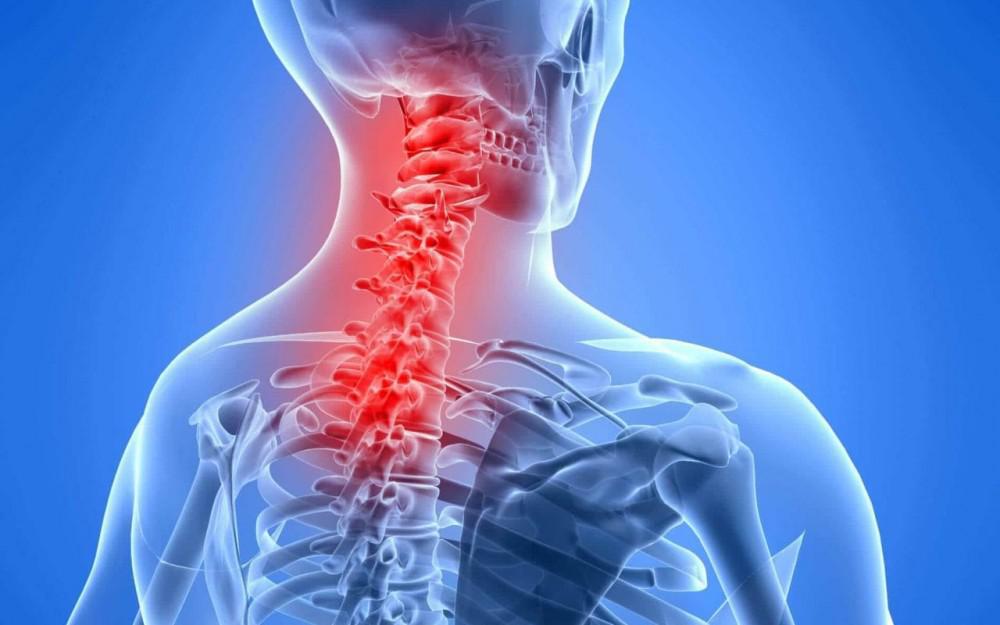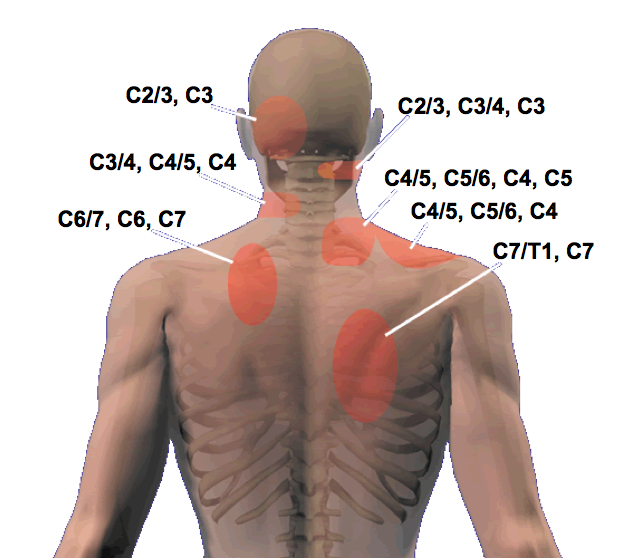Common Conditions
Cervical Spine Pain
Cervical spine pain refers to discomfort or pain originating from the neck region, which is composed of the seven vertebrae in the cervical spine. This part of the spine supports the head, protects the spinal cord, and allows for a wide range of motion. Cervical spine pathology can cause pain in this area, lead to secondary headaches or radiate to the shoulders, arms, or upper back.

What causes cervical spine pain?
Cervical spine pain can develop due to several factors, including:
- Degenerative changes: Age-related conditions, such as cervical spondylosis with disc degeneration, nerve entrapment and facet joint osteoarthritis.
- Herniated discs: A bulging or ruptured disc in the cervical spine can press on nearby nerves, causing pain which may be referred into the shoulder girdle or arms.
- Injury or trauma: Whiplash and other neck injuries are a common cause of neck pain.
- Spinal cord compression: Conditions such as moderately severe cervical spinal stenosis can compress the cervical spinal cord and produce pain in the neck or refer to other areas. Occasionally this is an emergency requiring surgical treatment.
Common symptoms of cervical spine pain
Symptoms associated with cervical spine pain may include:
- Localized pain: A sharp, aching, or throbbing pain in the neck area of across the shoulder girdle or the interscapular area.
- Radiating pain: Pain that extends to the shoulders, arms, often due to nerve involvement.
- Stiffness: Reduced range of motion, especially when trying to turn the head or look up and down. This may affect activities of daily living including sleeping or driving. This reduced motion may be due to arthritic joints, painful discs or muscle spasm.
- Numbness, tingling or weakness: Sensations or weakness in the arms or hands, which are often linked to nerve compression.
- Headaches: Tension, cervicogenic or great occipital neuralgia headaches originating from the neck are commonly associated with underlying neck conditions especially if there is associated local muscle spasm.
Diagnosis of cervical spine pain
Diagnosing cervical spine pain begins with a detailed medical history and physical examination. A spinal specialist will assess the onset, duration, and nature of your neck pain, as well as any related symptoms such as arm pain, numbness, or weakness.
The physical exam typically includes assessing neck movement, checking for tenderness, and testing nerve function in the arms and hands.
Imaging studies may be needed if symptoms are severe, persistent, or suggest nerve compression. These can include:
- X-rays to check for alignment or arthritis.
- MRI scans to detect disc problems, nerve impingement, or soft tissue changes.
- CT scans, nuclear medicine bone scans or nerve studies (EMG/NCS) may be used in select cases for further evaluation.
Accurate diagnosis is key to identifying the underlying cause and guiding effective treatment.
Management of cervical spine pain
Treatment for cervical spine pain depends on the cause and severity of the condition. Common options include:
- Physical therapy: Exercises to strengthen neck muscles, improve posture, and increase flexibility can help alleviate pain.
- Medications: Over-the-counter analgesics, muscle relaxants, or anti-inflammatory drugs may be used to manage symptoms.
- Injections: Steroid injections can reduce inflammation and provide temporary relief for severe pain. Injections can help with the diagnosis in complex cases.
- Radiofrequency neurotomy: In confirmed cervical facet joint pain, ablating or burning the small nerves to the neck joints can improve symptoms in the medium term but often needs repeating.
- Lifestyle modifications: Adopting ergonomic practices, improving posture, and avoiding activities that strain the neck can reduce pain.
- Surgical options: In cases of severe nerve compression, unremitting neck pain, or structural issues, surgical intervention such as spinal fusion, disc replacement or foraminotomy may be required.


